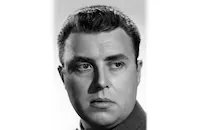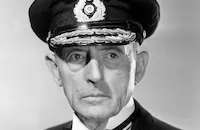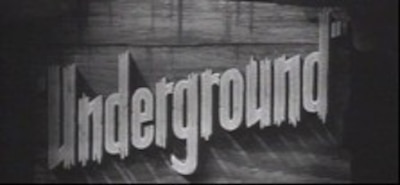Underground

Brief Synopsis
Cast & Crew
Vincent Sherman
Jeffrey Lynn
Philip Dorn
Kaaren Verne
Mona Maris
Peter Whitney
Film Details
Technical Specs

Synopsis
Eric Franken works with the German underground to broadcast anti-Nazi information to the German people. When his brother Kurt, a soldier, returns home after losing an arm in battle, Eric must double his efforts to hide his activities. On the night of Kurt's return, the family is visited by an old friend, Gustav Müller, who has been saddened by the death of his son in the war. Kurt, who is convinced of the nobility of the German cause, accuses the grieving man of being unpatriotic. Eric has planned a broadcast for that evening and, intending to sneak out of the house, leaves for his room. Kurt follows him and, noticing a phone number for Sylvia Helmuth, another member of the underground, teases Eric about his "girl friend." After Kurt leaves, Eric drives with the others to a location in the country. While he broadcasts from a studio hidden in a tow truck, the Gestapo zeros in on their location. Warned by Fraulein Gessner, an operative inside Gestapo headquarters, the group is able to escape but is forced to burn the truck and destroy the equipment. Hoping to trap the members of the group, the Gestapo orders the release of their former associate, Hoffman, from a concentration camp. They force Hoffman to set up a meeting in the café where Sylvia plays the violin. The group is warned of the trap, but two of its members are killed. Meanwhile, Kurt has introduced himself to Sylvia and is very attracted to her. When she tries to pick up new radio equipment, Kurt insists on accompanying her despite her efforts to dissuade him. The Gestapo is waiting and Sylvia is arrested and tortured. She reveals nothing, however, and learning of Kurt's romantic interest in her, the Gestapo asks him to win Sylvia's confidence and report on her activities. Kurt is deeply disturbed by the treatment Sylvia received from the Gestapo, but believing her to be innocent, he agrees. Eventually, he tells her that he has been watching her and begs her to go away with him. While they talk, however, Kurt realizes that she is in fact a member of the underground and leaves her house. At home, Eric questions Kurt, determined to kill his own brother if necessary to defend the underground, but Kurt admits that he can never betray Sylvia because he loves her too much. Hoping to warn Sylvia of the danger, Kurt visits her one more time and sees her leave with other underground members. After he informs the Gestapo, he rushes Sylvia away and learns for the first time that Eric is one of the people he has betrayed. A distraught Kurt wants to tell Eric that he did not know of his brother's involvement, but Gessner convinces him that he can be of more use to Eric if he pretends that he willingly turned in his own brother. Kurt agrees to join the underground and allow Eric to die believing that he betrayed him, but on the day of the execution, Kurt broadcasts illegally over speakers at the execution site and, by reciting part of a motto that has always hung in the Franken home, lets Eric know that he will continue his work.

Director

Vincent Sherman
Cast

Jeffrey Lynn

Philip Dorn

Kaaren Verne

Mona Maris

Peter Whitney
Martin Kosleck
Erwin Kalser
Ilka Gruning

Frank Reicher
Egon Brecher

Ludwig Stossel
Hans Schumm
Wolfgang Zilzer
Roland Varno

Henry Brandon
Lotte Palfi
Lisa Golm
Louis Arco
Roland Drew
Robert Davis
Carl Ottmar
Lionel Royce
Ernst Hausman

Paul Panzer
Will Kaufman
Ludwig Hardt
Hans Wollenberger
Lester Alden
Henry Rowland
John Piffle
Erno Verebes

Hans Conreid
David Hoffman

Edith Angold
William Vaughn
Norbert Schiller
Louis Adlon
Gretl Sherk
Fred Vogeding
Arno Frey
Walter Bonn
Clem Wilenchick
Henry Victor
Hans Von Morhart
Otto Reichow
Bob Stevenson
Fred Giermann
Rolf Lindau
Glen Cavender
Crew
Adolph Deutsch
Leo F. Forbstein
Bryan Foy
Oliver H. P. Garrett
Damon Giffard
Charles Grayson
Sid Hickox
William Jacobs
Bill Kissel
Charles Lang
Edwin Justus Mayer
Charles Novi
Thomas Pratt
Perc Westmore

Film Details
Technical Specs

Articles
Underground -
By Frank Miller

Underground -
Quotes
Trivia
Notes
A 4 August 1940 Hollywood Reporter news item notes that John Garfield was first assigned to the lead. Philip Dorn was borrowed from M-G-M for the role of "Eric." The Variety review notes that Warner Bros. announced last-minute changes to the film's script to include a reference to Rudolf Hess's March 10, 1941 flight to Scotland in an abortive attempt to negotiate a peace between Germany and Great Britain. The review points out that the advertised changes amounted to only a few lines of dialogue "without plot significance."















